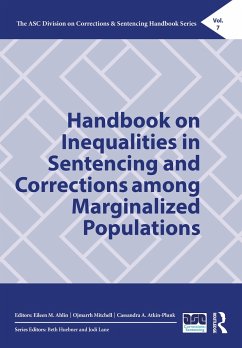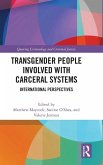Handbook on Inequalities in Sentencing and Corrections Among Marginalized Populations
Herausgeber: Ahlin, Eileen M; Atkin-Plunk, Cassandra A; Mitchell, Ojmarrh
Handbook on Inequalities in Sentencing and Corrections Among Marginalized Populations
Herausgeber: Ahlin, Eileen M; Atkin-Plunk, Cassandra A; Mitchell, Ojmarrh
- Gebundenes Buch
- Merkliste
- Auf die Merkliste
- Bewerten Bewerten
- Teilen
- Produkt teilen
- Produkterinnerung
- Produkterinnerung
The Handbook on Inequalities in Sentencing and Corrections among Marginalized Populations offers state-of-the-art volumes on seminal and topical issues that span the fields of sentencing and corrections.
Andere Kunden interessierten sich auch für
![The Evolution of Ethics in America The Evolution of Ethics in America]() Laurence Armand FrenchThe Evolution of Ethics in America179,99 €
Laurence Armand FrenchThe Evolution of Ethics in America179,99 €![Transgender People Involved with Carceral Systems Transgender People Involved with Carceral Systems]() Transgender People Involved with Carceral Systems170,99 €
Transgender People Involved with Carceral Systems170,99 €![Reimagining Rehabilitation Reimagining Rehabilitation]() Lol BurkeReimagining Rehabilitation174,99 €
Lol BurkeReimagining Rehabilitation174,99 €![The Routledge Guide to Working in Criminal Justice The Routledge Guide to Working in Criminal Justice]() Ester RagoneseThe Routledge Guide to Working in Criminal Justice183,99 €
Ester RagoneseThe Routledge Guide to Working in Criminal Justice183,99 €![Desistance Transitions and the Impact of Probation Desistance Transitions and the Impact of Probation]() Sam KingDesistance Transitions and the Impact of Probation118,99 €
Sam KingDesistance Transitions and the Impact of Probation118,99 €![The Routledge International Handbook of Penal Abolition The Routledge International Handbook of Penal Abolition]() The Routledge International Handbook of Penal Abolition283,99 €
The Routledge International Handbook of Penal Abolition283,99 €![The Political Economy of Plea Bargaining The Political Economy of Plea Bargaining]() Robert SchehrThe Political Economy of Plea Bargaining170,99 €
Robert SchehrThe Political Economy of Plea Bargaining170,99 €-
-
-
The Handbook on Inequalities in Sentencing and Corrections among Marginalized Populations offers state-of-the-art volumes on seminal and topical issues that span the fields of sentencing and corrections.
Produktdetails
- Produktdetails
- Verlag: Taylor & Francis
- Seitenzahl: 290
- Erscheinungstermin: 11. Oktober 2022
- Englisch
- Abmessung: 254mm x 178mm x 18mm
- Gewicht: 721g
- ISBN-13: 9781032145624
- ISBN-10: 1032145625
- Artikelnr.: 64360179
- Herstellerkennzeichnung
- Libri GmbH
- Europaallee 1
- 36244 Bad Hersfeld
- gpsr@libri.de
- Verlag: Taylor & Francis
- Seitenzahl: 290
- Erscheinungstermin: 11. Oktober 2022
- Englisch
- Abmessung: 254mm x 178mm x 18mm
- Gewicht: 721g
- ISBN-13: 9781032145624
- ISBN-10: 1032145625
- Artikelnr.: 64360179
- Herstellerkennzeichnung
- Libri GmbH
- Europaallee 1
- 36244 Bad Hersfeld
- gpsr@libri.de
Eileen M. Ahlin is Associate Professor of Criminal Justice in the School of Public Affairs at Penn State Harrisburg. Her research uses an ecological framework to study violence. Using a multi-pronged, holistic approach, she seeks to identify policies and practices that address risk and protective factors among informal and formal social controls such as neighborhoods, correctional facilities, and alternatives to incarceration. Dr. Ahlin is a 2016 W.E.B. Du Bois Fellow of the National Institute of Justice. She is author or co-author of several books and edited volumes, including Youth Violence in Context: An Ecological Routine Activity Framework (2022), Taking Problem-Solving Courts to Scale: Diverse Applications of the Specialty Court Model (2021), and Living with Violence (2023). Ojmarrh Mitchell is an Associate Professor in the School of Criminology and Criminal Justice at the Arizona State University. Professor Mitchell earned his PhD in Criminology and Criminal Justice from the University of Maryland with a doctoral minor in Measurement, Statistics, and Evaluation. His research interests center on criminal justice policy, particularly in the areas of drug control, sentencing and corrections, and racial fairness in the criminal justice system. More broadly, Dr. Mitchell studies the effectiveness and fairness of criminal justice sanctions. His research has appeared in many criminology journals including Criminology & Public Policy , Journal of Quantitative Criminology, Journal of Research in Crime and Delinquency, Justice Quarterly, and Journal of Experimental Criminology. Cassandra A. Atkin-Plunk is Associate Professor and Associate Director in the School of Criminology and Criminal Justice at Florida Atlantic University. Her research interests span both institutional and community corrections with an emphasis on contemporary issues in corrections, including the reentry and reintegration of individuals returning to the community from incarceration. Dr. Atkin-Plunk examines evidence-based practices and conducts program and policy evaluations to identify what works in corrections. Her research is largely community-based, and she won the 2018 FAU Presidential Award for Outstanding Community-Engaged Research. Her research has been published in Justice Quarterly, Criminal Justice and Behavior, Journal of Criminal Justice, Journal of Interpersonal Violence, Criminal Justice Policy Review, and Journal of Offender Rehabilitation.
Introduction
Eileen M. Ahlin, Ojmarrh Mitchell, and Cassandra A. Atkin-Plunk
1. Homeless Defendants in Felony Court: Cumulative Case Outcomes and
Institutional Bias
Katharine Brown and Ojmarrh Mitchell
2. Equity in Jeopardy: How Flawed Immigration Policy Creates Double
Punishments for Non-Citizen Service Members and Veterans
Anne Douds and Kyle Troeger
3. What an Examination of Previously Untested Sexual Assault Kits Tell
us about the Patterns of Victimization and Case Outcomes for Black
Women and Girls
Rachel E. Lovell, Adrianne M. Crawford Fletcher, Danielle Sabo, Laura
Overman, and Daniel J. Flannery
4. Racial Bias and Amelioration Strategies for Juvenile Risk Assessment
Leah Butler, Zachary Hamilton, Amber Krushas, Alex Kigerl, and
Melissa Kowalski
5. The Debate and Concerns of Risk Assessment with Historically
Marginalized Populations
Adam Matz
6. Justice-involved Populations with Disabilities: Examining
Inequalities During Incarceration and Reentry
Kimberly D. Dodson and Joshua R. Ruffin
7. "We, as Women, Focus on Relationships:" Women Jail Residents'
Resource Attainment Efforts via Connections with Female Correctional
Officers
Lindsay Smith and Sydney Ingel
8. Experiences of Transgender and Gender Nonconforming Individuals in
Jail/Prison: Navigating Tensions
L. Caitlin Kanewske, Angela Hattery, Danielle S. Rudes, Shannon
Magnuson, and Zach Zaborowski
9. Using Technology to Respond to the Safety, Housing, and Programming
Challenges Associated with Transgender Inmates: Building a Research
Program to Study the Effectiveness of Technology-Delivered
Programming
Jennifer L. Lanterman, M. Jennelle Goodwin, Marc Bello, and Morgan N.
Bucy
10. The Pains of Imprisonment through a Rainbow Lens: An Overview of the
Marginalized Conditions of Incarceration for LGBTQ Persons
Calli Cain and Jared Ellison
11. Incarcerated Indigenous and Native American Populations
Reneè Lamphere and Matthew Hassett
12. Aging in Prison: Understanding Elderly Incarcerated Populations
Beatriz Amalfi Marques, Stuti Kokkalera, and Michael Vaughn
13. How COVID-19 Amplified Trauma and Marginalization among Carceral
Populations: Using the Pandemic Experience to Rethink Incarceration
Eileen Ahlin, Annie Bunce, and Anna Kotova
Eileen M. Ahlin, Ojmarrh Mitchell, and Cassandra A. Atkin-Plunk
1. Homeless Defendants in Felony Court: Cumulative Case Outcomes and
Institutional Bias
Katharine Brown and Ojmarrh Mitchell
2. Equity in Jeopardy: How Flawed Immigration Policy Creates Double
Punishments for Non-Citizen Service Members and Veterans
Anne Douds and Kyle Troeger
3. What an Examination of Previously Untested Sexual Assault Kits Tell
us about the Patterns of Victimization and Case Outcomes for Black
Women and Girls
Rachel E. Lovell, Adrianne M. Crawford Fletcher, Danielle Sabo, Laura
Overman, and Daniel J. Flannery
4. Racial Bias and Amelioration Strategies for Juvenile Risk Assessment
Leah Butler, Zachary Hamilton, Amber Krushas, Alex Kigerl, and
Melissa Kowalski
5. The Debate and Concerns of Risk Assessment with Historically
Marginalized Populations
Adam Matz
6. Justice-involved Populations with Disabilities: Examining
Inequalities During Incarceration and Reentry
Kimberly D. Dodson and Joshua R. Ruffin
7. "We, as Women, Focus on Relationships:" Women Jail Residents'
Resource Attainment Efforts via Connections with Female Correctional
Officers
Lindsay Smith and Sydney Ingel
8. Experiences of Transgender and Gender Nonconforming Individuals in
Jail/Prison: Navigating Tensions
L. Caitlin Kanewske, Angela Hattery, Danielle S. Rudes, Shannon
Magnuson, and Zach Zaborowski
9. Using Technology to Respond to the Safety, Housing, and Programming
Challenges Associated with Transgender Inmates: Building a Research
Program to Study the Effectiveness of Technology-Delivered
Programming
Jennifer L. Lanterman, M. Jennelle Goodwin, Marc Bello, and Morgan N.
Bucy
10. The Pains of Imprisonment through a Rainbow Lens: An Overview of the
Marginalized Conditions of Incarceration for LGBTQ Persons
Calli Cain and Jared Ellison
11. Incarcerated Indigenous and Native American Populations
Reneè Lamphere and Matthew Hassett
12. Aging in Prison: Understanding Elderly Incarcerated Populations
Beatriz Amalfi Marques, Stuti Kokkalera, and Michael Vaughn
13. How COVID-19 Amplified Trauma and Marginalization among Carceral
Populations: Using the Pandemic Experience to Rethink Incarceration
Eileen Ahlin, Annie Bunce, and Anna Kotova
Introduction
Eileen M. Ahlin, Ojmarrh Mitchell, and Cassandra A. Atkin-Plunk
1. Homeless Defendants in Felony Court: Cumulative Case Outcomes and
Institutional Bias
Katharine Brown and Ojmarrh Mitchell
2. Equity in Jeopardy: How Flawed Immigration Policy Creates Double
Punishments for Non-Citizen Service Members and Veterans
Anne Douds and Kyle Troeger
3. What an Examination of Previously Untested Sexual Assault Kits Tell
us about the Patterns of Victimization and Case Outcomes for Black
Women and Girls
Rachel E. Lovell, Adrianne M. Crawford Fletcher, Danielle Sabo, Laura
Overman, and Daniel J. Flannery
4. Racial Bias and Amelioration Strategies for Juvenile Risk Assessment
Leah Butler, Zachary Hamilton, Amber Krushas, Alex Kigerl, and
Melissa Kowalski
5. The Debate and Concerns of Risk Assessment with Historically
Marginalized Populations
Adam Matz
6. Justice-involved Populations with Disabilities: Examining
Inequalities During Incarceration and Reentry
Kimberly D. Dodson and Joshua R. Ruffin
7. "We, as Women, Focus on Relationships:" Women Jail Residents'
Resource Attainment Efforts via Connections with Female Correctional
Officers
Lindsay Smith and Sydney Ingel
8. Experiences of Transgender and Gender Nonconforming Individuals in
Jail/Prison: Navigating Tensions
L. Caitlin Kanewske, Angela Hattery, Danielle S. Rudes, Shannon
Magnuson, and Zach Zaborowski
9. Using Technology to Respond to the Safety, Housing, and Programming
Challenges Associated with Transgender Inmates: Building a Research
Program to Study the Effectiveness of Technology-Delivered
Programming
Jennifer L. Lanterman, M. Jennelle Goodwin, Marc Bello, and Morgan N.
Bucy
10. The Pains of Imprisonment through a Rainbow Lens: An Overview of the
Marginalized Conditions of Incarceration for LGBTQ Persons
Calli Cain and Jared Ellison
11. Incarcerated Indigenous and Native American Populations
Reneè Lamphere and Matthew Hassett
12. Aging in Prison: Understanding Elderly Incarcerated Populations
Beatriz Amalfi Marques, Stuti Kokkalera, and Michael Vaughn
13. How COVID-19 Amplified Trauma and Marginalization among Carceral
Populations: Using the Pandemic Experience to Rethink Incarceration
Eileen Ahlin, Annie Bunce, and Anna Kotova
Eileen M. Ahlin, Ojmarrh Mitchell, and Cassandra A. Atkin-Plunk
1. Homeless Defendants in Felony Court: Cumulative Case Outcomes and
Institutional Bias
Katharine Brown and Ojmarrh Mitchell
2. Equity in Jeopardy: How Flawed Immigration Policy Creates Double
Punishments for Non-Citizen Service Members and Veterans
Anne Douds and Kyle Troeger
3. What an Examination of Previously Untested Sexual Assault Kits Tell
us about the Patterns of Victimization and Case Outcomes for Black
Women and Girls
Rachel E. Lovell, Adrianne M. Crawford Fletcher, Danielle Sabo, Laura
Overman, and Daniel J. Flannery
4. Racial Bias and Amelioration Strategies for Juvenile Risk Assessment
Leah Butler, Zachary Hamilton, Amber Krushas, Alex Kigerl, and
Melissa Kowalski
5. The Debate and Concerns of Risk Assessment with Historically
Marginalized Populations
Adam Matz
6. Justice-involved Populations with Disabilities: Examining
Inequalities During Incarceration and Reentry
Kimberly D. Dodson and Joshua R. Ruffin
7. "We, as Women, Focus on Relationships:" Women Jail Residents'
Resource Attainment Efforts via Connections with Female Correctional
Officers
Lindsay Smith and Sydney Ingel
8. Experiences of Transgender and Gender Nonconforming Individuals in
Jail/Prison: Navigating Tensions
L. Caitlin Kanewske, Angela Hattery, Danielle S. Rudes, Shannon
Magnuson, and Zach Zaborowski
9. Using Technology to Respond to the Safety, Housing, and Programming
Challenges Associated with Transgender Inmates: Building a Research
Program to Study the Effectiveness of Technology-Delivered
Programming
Jennifer L. Lanterman, M. Jennelle Goodwin, Marc Bello, and Morgan N.
Bucy
10. The Pains of Imprisonment through a Rainbow Lens: An Overview of the
Marginalized Conditions of Incarceration for LGBTQ Persons
Calli Cain and Jared Ellison
11. Incarcerated Indigenous and Native American Populations
Reneè Lamphere and Matthew Hassett
12. Aging in Prison: Understanding Elderly Incarcerated Populations
Beatriz Amalfi Marques, Stuti Kokkalera, and Michael Vaughn
13. How COVID-19 Amplified Trauma and Marginalization among Carceral
Populations: Using the Pandemic Experience to Rethink Incarceration
Eileen Ahlin, Annie Bunce, and Anna Kotova








